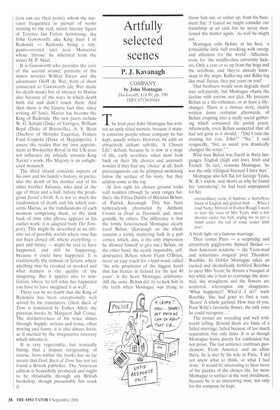Artfully selected scenes
P. J. Kavanagh COMPANY by John Montague Duckworth, £14.99, pp. 190 ISBN 0715630164 The Irish poet John Montague has written an aptly titled memoir, because it mainly concerns people whose company he has kept, usually writers. However, he adds an attractively defiant subtitle, 'A Chosen Life'; defiant, because he is now at a stage of life, early seventies, when most look back on their life choices and anxiously wonder if they had any 'choice' at all. Such preoccupations can be glimpsed swimming below the surface of his story, but they seldom come to the top.
At first sight his chosen ground looks well trodden (though he soon ranges further): the Fifties Dublin of Brendan Behan, of Patrick Kavanagh. This has been remorselessly chronicled by Anthony Cronin in Dead as Doornails and, more genially, by others. The difference is that the firmly heterosexual Montague clearly loved Behan. (Kavanagh on the whole remains a darkly muttering hulk in a pub corner, which, alas, is the only impression he allowed himself to give me.) Behan, on the other hand, the nearly impossible, selfdestructive Behan, whom Flann O'Brien, never an easy touch for a kind word, called 'the sole proprietor of the biggest heart that has beaten in Ireland for the last 40 years', is the heart Montague celebrates. All] the same, Behan did try to kick him in the teeth when Montague was trying to throw him out, or rather up, from his basement flat: 'I feared we might consider our friendship at an end, but he never mentioned the matter again.' As well he might not.
Montague calls Behan, at his best, 'a formidable little bull crackling with energy and affection for the world'. Affection, even, for 'the middle-class university fuckers. Only a year or so up from the bogs and the stirabout, and they're already kneedeep in the angst, Kafka-ing and Rilke-ing like mad. Jaysus, they put years on you!'
That freshness would soon degrade itself into self-parody, but Montague charts the decline with sorrow, not glee. He presents Behan as a life-enhancer, or at least a lifechanger. There is a riotous story, clearly written down verbatim afterwards, of Behan erupting into a stuffy social gathering which contained the parish priest. Afterwards, even Behan suspected that all had not gone as it should. "Did I ruin the evening for you, John?" "No," I said resignedly, "but, as usual, you drastically changed the script." ' Wild man Behan was fluent in three languages. English (high and low), Irish and French. 'In fact,' remarks Montague, 'he was the only trilingual bisexual I have met.'
Montague also fell flat for George Yeats, W. B's widow, and shows us why he found her 'entrancing'; he had been unprepared for her
extraordinary sense of humour, a marvellous blend of English and grafted Irish .. . When I read Nancy Mitford or Evelyn Waugh I seem to hear the voice of Mrs Yeats, with a few sherries under her belt, urging me to put a bomb under the tail of some senior Irish poet.
A fresh light on a famous marriage.
Then comes Paris — a surprising and attractively gigglesome Samuel Becket — then American academe — the Yeats-mad and sometimes magical poet Theodore Roethke. In Dublin Montague takes an excited and alcoholically fortified Roethke to meet Mrs Yeats; he thrusts a bouquet at her while she is bent to rearrange the doormat, she straightens and the flowers are scattered, whereupon she disappears. 'What happened? What'd I do?' wails Roethke. She had gone to find a vase. 'Roses! A whole garland. How nice of you. Poor Willy's favourite flower, the only ones he could recognise ...'
The stories are revealing and well told, worth telling. Behind them are hints of a failed marriage, failed because of too much separation, but only hints. It is as though Montague trusts poetry for confession but not prose. The last sentence confesses puzzlement. From America, and an affair there, he is met by his wife in Paris. 'I did not know what to think, or what I had done.' It would be interesting to hear more of the puzzles of the chosen life, for more Montague to surface in the next instalment, because he is an interesting man, not only for the company he kept.


































































 Previous page
Previous page